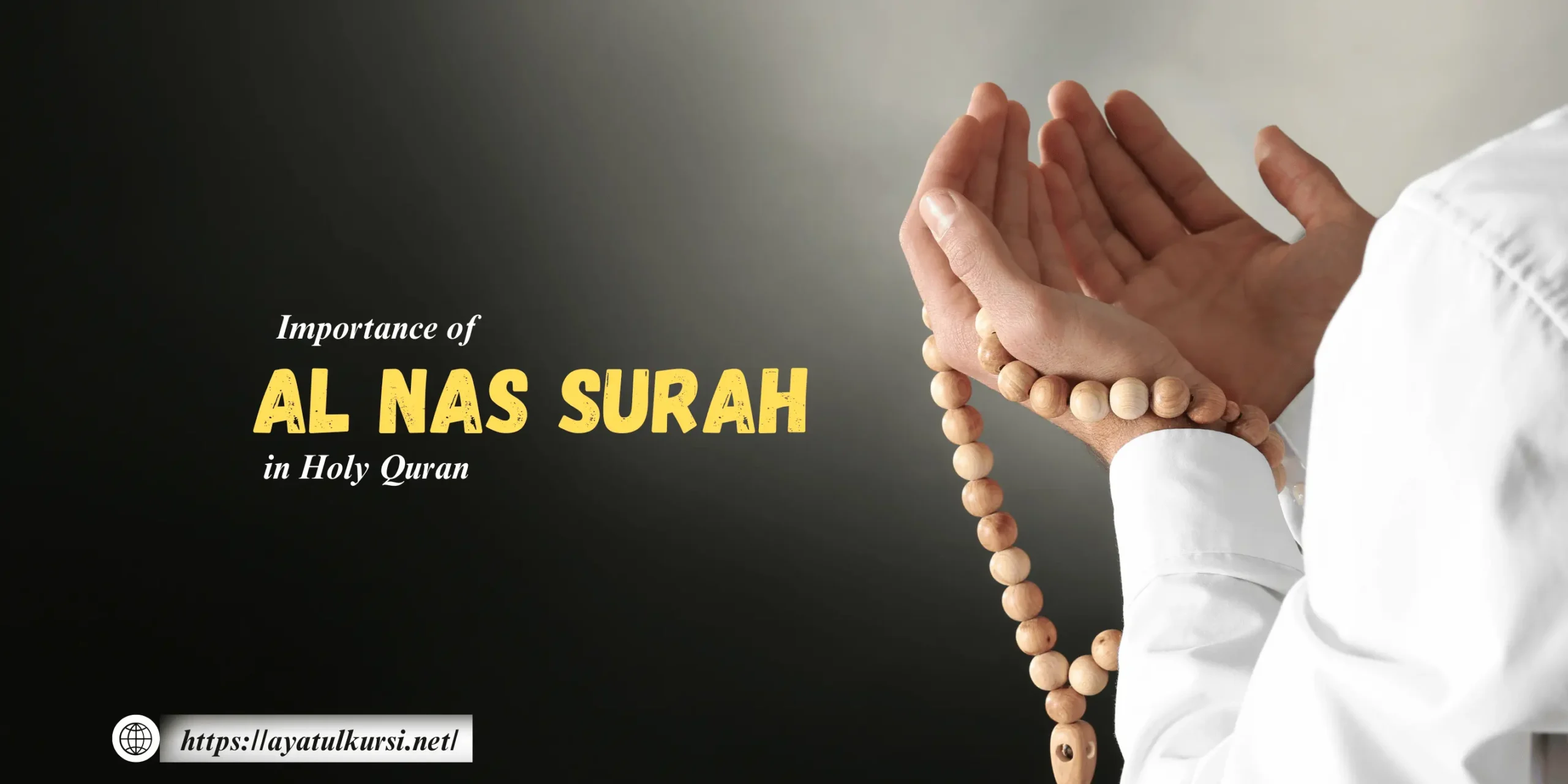
Surah Al Nas is Chapter 114th, consisting of 6 verses and the Last chapter of the Holy Quran. It holds great significance as a protective prayer seeking refuge from evil, often paired with Surah Al-Falaq (113) and Al-Ikhlas (112) during recitations for protection. Along with Surah Al-Falaq and Surah Al-Ikhlas, it forms the trio known as the Mu’awwidhat, frequently recited for spiritual protection and healing.
Revealed in Mecca, Surah Al Nas addresses the need to seek protection from the subtle and hidden evils that affect humans, particularly whisperings of doubt and evil suggestions from Satan (Shaytan) and jinn. It emphasizes reliance on Allah as the ultimate refuge.
Al Nas Surah in English
Text of Al Nas Surah in English
Say,
- “I seek refuge in the Lord of mankind,
- The King of mankind,
- The Allah of mankind,
- From the evil of the whisperer who withdraws,
- Who whispers in the hearts of mankind,
- Among jinn and among mankind.”
Word-by-Word Translation and Explanation
- Say: Command to the Prophet Muhammad (PBUH) to declare aloud.
- I seek refuge: A plea for protection.
- Lord, King, Allah of mankind: Emphasizes Allah’s comprehensive authority and care over all humans.
- Evil whisperer: Refers to Satan or evil forces that secretly suggest harmful thoughts.
- Whispers in the hearts: Symbolizes internal temptations and doubts.
- Among jinn and mankind: Indicates that evil influences come from both visible (humans) and invisible (jinn) worlds.
The Concept of Seeking Refuge and Protection
Surah Al Nas teaches that ultimate protection comes from Allah Almighty. Humans are vulnerable to unseen forces and internal struggles, and seeking refuge in Allah is both an act of faith and a means to safeguard one’s heart and mind.
Understanding the “King of Mankind” and “Allah of Mankind”
The Surah mentions three titles for Allah—Lord, King, and Allah—to highlight His full authority: as caretaker (Lord), ruler (King), and deity worthy of worship (Allah). This triad shows that protection is holistic, encompassing physical, spiritual, and existential aspects of life. It emphasizes that Allah’s guardianship is all-encompassing, providing not only worldly protection but also spiritual guidance and ultimate sovereignty over all creation. Believers are reminded to turn to Him alone in times of vulnerability and seek refuge in His unmatched power, mercy, and compassionate care.
Types of Protection Highlighted in Surah Al Nas
- Protection from External Evils: Jinn, Shaytan, and Harmful Influences
The Surah asks for protection from external harmful beings and forces that try to mislead humans. - Protection from Internal Evils: Whisperings of the Heart and Soul
It also focuses on guarding the inner self from negative thoughts, doubts, and temptations that can lead to spiritual harm. - Spiritual and Psychological Safeguarding
Reciting and reflecting on this Surah helps nurture mental peace and spiritual resilience.
Comparing Surah Al Nas with Other Protective Surahs
- Relationship with Surah Al-Falaq and Surah Al-Ikhlas
These three chapters are often recited together as they complement each other: Al-Falaq protects from external harms, Al-Nas protects from internal evils, and Al-Ikhlas affirms Allah’s oneness, strengthening faith. - Ayatul Kursi
Although not part of the “Mu’awwidhat,” Ayatul Kursi (Quran 2:255) is also widely recited for protection, emphasizing Allah’s power and sovereignty over all creation. Muslim also recite Ayatul Kursi for protection from Evil eyes.
Benefits of Reciting Surah Al Nas Regularly
- Spiritual Peace and Mental Calmness
Regular recitation brings tranquility, helping to soothe the mind and heart against stress and anxiety. - Guarding Against Evil Eye and Black Magic
It is believed to shield the reciter from harmful supernatural effects and malicious intentions. - Strengthening Faith and Reliance on Allah
The Surah reinforces the believer’s trust in Allah’s power and mercy, fostering resilience against life’s challenges.
